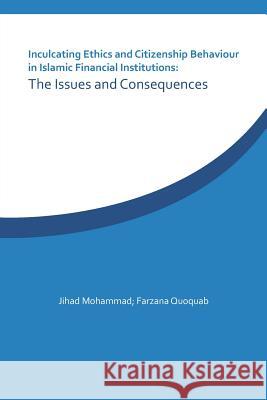Inculcating Ethics and Citizenship Behaviour in Islamic Financial Institutions: The Issues and Consequences » książka
Inculcating Ethics and Citizenship Behaviour in Islamic Financial Institutions: The Issues and Consequences
ISBN-13: 9781482866490 / Angielski / Miękka / 2016 / 118 str.
Inculcating Ethics and Citizenship Behaviour in Islamic Financial Institutions: The Issues and Consequences
ISBN-13: 9781482866490 / Angielski / Miękka / 2016 / 118 str.
(netto: 63,85 VAT: 5%)
Najniższa cena z 30 dni: 66,13
ok. 16-18 dni roboczych.
Darmowa dostawa!
This book enables its readers to understand Islamic ethics at workplace', and its role in enhancing the performance and productivity of organization. Moreover, this timely and important book is an essential guide for academician, researchers, and managers to enhance and enrich their understanding and knowledge about the effective role of Islamic work ethics. The concept of work ethic is acknowledged as an important indicator of the likely success of all type of organization. However, the bulk of research pertaining to work ethic and various organizational and individual outcomes has focused predominantly on the concept of Protestant work ethic and not much attention has been given to assess the notion of Islamic work ethic. Nonetheless, it is necessary to understand other work ethics from different religious faiths in order to get a better understanding about the work ethic' phenomenon. This book aims to bridge this gap in the literature, and advance the knowledge regarding work ethics from Islamic perspective. This book presents some insightful strategies for Islamic financial institutions to manage workplace ethics. Those who are eager to advance their knowledge about Islamic work ethics, organizational justice and organizational citizenship behaviour will find this book very useful.
This book enables its readers to understand `Islamic ethics at workplace’, and its role in enhancing the performance and productivity of organization. Moreover, this timely and important book is an essential guide for academician, researchers, and managers to enhance and enrich their understanding and knowledge about the effective role of Islamic work ethics. The concept of work ethic is acknowledged as an important indicator of the likely success of all type of organization. However, the bulk of research pertaining to work ethic and various organizational and individual outcomes has focused predominantly on the concept of Protestant work ethic and not much attention has been given to assess the notion of Islamic work ethic. Nonetheless, it is necessary to understand other work ethics from different religious faiths in order to get a better understanding about the `work ethic’ phenomenon. This book aims to bridge this gap in the literature, and advance the knowledge regarding work ethics from Islamic perspective. This book presents some insightful strategies for Islamic financial institutions to manage workplace ethics. Those who are eager to advance their knowledge about Islamic work ethics, organizational justice and organizational citizenship behaviour will find this book very useful.











